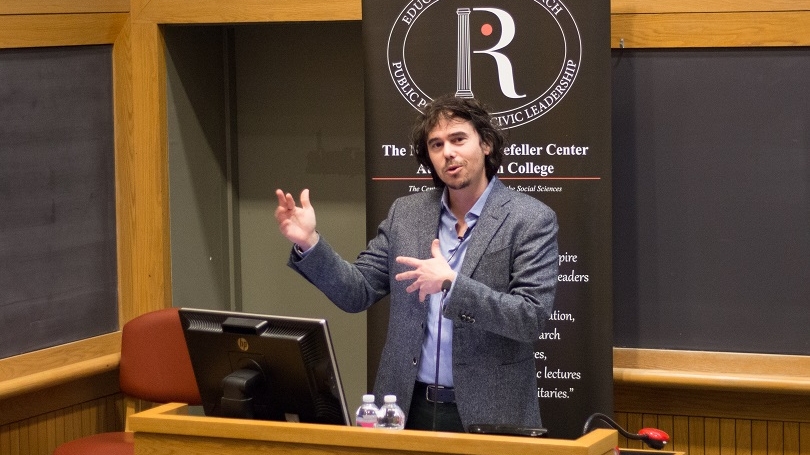
- Public Policy
- Leadership
- Funding
- News & Events
- About the Center
Back to Top Nav
Back to Top Nav
Back to Top Nav
Back to Top Nav
On Tuesday, February 5, 2019, University of Chicago history professor and economic historian Jonathan Levy spoke at the Nelson A. Rockefeller Center. His talk, titled “Instability and Inequality: American Capitalism after the Volcker Shock of 1980,” touched on the importance of the United States Federal Reserve in global economic policymaking, the links between inequality and the Great Recession, and the roots of contemporary economic transformations.
Levy said that in his field, economic history, “the action is back in history departments” after a temporary migration to economics departments in the 1970s and 1980s. “Especially since 2008 and the Great Recession, historians have become more interested in economic questions than they were in the past.”
Levy became interested in economic history after the fall of the Soviet Union, when a consensus emerged about “the new economy, technology … [and] globalization.” He said that the time since has been dramatic. “With the financial crisis of 2007-2008, with the Great Recession that followed, we’re still living in the political aftermath of those events,” he noted. His research has focused on contemporary economic history because “students that were taking my classes wanted the story to come up through 2008, to make sense of the Great Recession.”
He highlighted the 1980s as a critical turning point for the global economy. The preceding decade was characterized by rising inflation, falling male employment, and an “across-the-board crisis.” The “Volcker Shock” – named after then-chairman of the Federal Reserve Paul Volcker – is shorthand for the rapid rise in interest rates and subsequent recessions in 1981-1982. “[The Volcker Shock],” Levy said, “induces a sharp recession that just purges all sorts of unprofitable fixed capital … and a shift of capital investment into financial forms.”
High interest rates supported the value of the U.S. dollar internationally and encouraged foreign investment in U.S. assets, especially the stock market. This, in turn, supported high-wage service jobs, but accelerated the loss of jobs in manufacturing facilities. “When you get to the 1980s, you have a very different political economy,” Levy noted. “[We see] declining rates of investment in fixed assets like factories, and capital moves into financial assets. It moves into stocks, it moves into bonds, and it moves into real estate. You’re not employing people as much as you were.”
He tied this to the rise of economic inequality in the U.S. High-paid service jobs, like bankers, lawyers, and accountants, created demand for low-wage jobs that catered to their needs, like nannies, restaurant services, and home healthcare workers, according to Levy. “So you kind of gut out the middle, which was tied to male factory employment, and you grow the economy at the top and the bottom.”
Levy noted that this transition “wasn’t all bad.” The post-war, pre-Volcker economy, he noted, was great for high school-educated white males, but not for women or minorities. The new economy, however, is “turbulent.” “It’s led to a lot of new dissatisfactions about the quality of work in the service sector, in terms of the inequality of pay and the inequality of wealth and income.”
He connected these dissatisfactions to contemporary political events, including the rise of President Trump’s nostalgic “Make America Great Again.” However, Levy also pointed out that politicians on the left that pine for the wealth distribution of the post-war economy are being nostalgic too. “It strikes me,” he said, “that you would not want to return to men working eight hours a day in steel mills, where the average life expectancy was 56 and you were deaf by 40. We have to kind of rethink what it would mean to have dignified work.”
Levy said that gender is absolutely key in the question of dignified work. “The service economy is … typically seen as feminized and not worthy as dignified male labor,” Levy said. “Thinking about the positive aspects of that labor – that people are socially connected, they deal with one another, they help one another – as worthy of dignity” is important in today’s postindustrial economy.
In his talk, Levy pointed out the uncertainty the Federal Reserve faced when making decisions about the Volcker Shock. According to transcripts from Federal Reserve meetings, Volcker at one point simply stated that “we can speculate about everything. I don’t know how to do this.” Yet Volcker’s actions, Levy said, created an economy-wide reboot that secured the global primacy of the dollar and spurred a desire among investors to want to keep investment options open. It raised questions about what work is suitable for who and shook the political system into a new paradigm. “The current moment,” Levy said, “begins in the 1980s.” How the United States addresses that moment is still to be seen.
Written by Kyle Mullins' 22, Rockefeller Center Student Program Assistant for Public Programs
The views and opinions expressed and any materials presented during a public program are the speaker’s own and do not necessarily represent the views and opinions of the Rockefeller Center or constitute an endorsement by the Center.